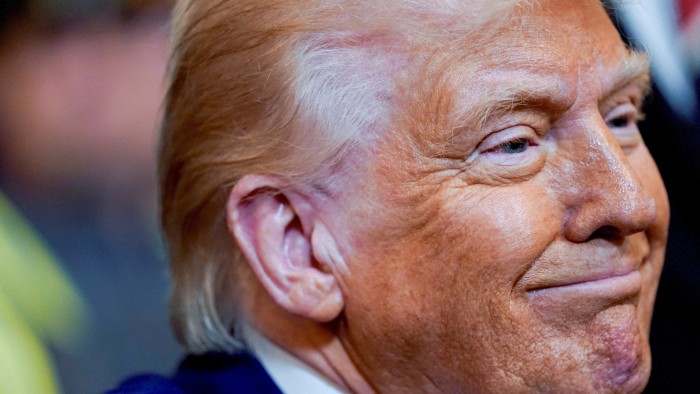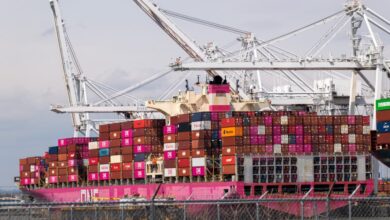Trump defies market tumult and pushes ahead with trade war

Unlock the White House Watch newsletter for free
Your guide to what the 2024 US election means for Washington and the world
Donald Trump rattled global investors again on Tuesday as he pressed ahead with his plan for aggressive tariffs on America’s largest trading partners even as he touted potential deals with some US allies.
Equity markets fell sharply as Trump failed to soothe traders’ nerves just hours before he was set to hit countries from the EU to China with steep new levies, tilting the world into a full-blown trade war.
White House officials including Treasury secretary Scott Bessent had sought on Tuesday to talk up possible trade negotiations with South Korea, Japan and other countries — a message that gave hope to investors that Trump could soften his stance after pressure from billionaire allies, trading partners, and Republicans in Congress.
But any relief was shortlived as it became clear that Trump was pushing ahead with his plan to unload an arsenal of tariffs against trading partners, ushering in a new era of global trade conflict.
The new blitz of Trump tariffs from Wednesday will include additional levies on China, despite Beijing’s warning that it would “fight to the end” in a fast-developing trade conflict.
The US’s extra 50 per cent tariff on China, the world’s second-largest economy, would “be going into effect at 12.01am” eastern time on Wednesday, according to White House press secretary Karoline Leavitt.
“Everyone keeps hoping, keeps waiting for a pause in tariffs,” said Peter Tchir, head of macro strategy at Academy Securities. “But we’ve just slapped on the extra increased tariffs on China. We’re slowly losing this optimism that this is a negotiating tactic. That’s why trading has been so volatile today.”
The benchmark S&P 500 index was up as much as 4.1 per cent early in the trading session, but ended with a loss of 1.6 per cent after Leavitt’s remarks — marking a fourth consecutive day of intense turbulence in Wall Street equities. Apple, which is heavily exposed to China through its supply chains, has dropped more than 8 per cent this week alone as investors worry about its margins.
The $29tn US Treasury market has also come under rising selling pressure in the past two days, sending long-term borrowing costs jumping as volatility prompts hedge funds to sharply scale back on risk.
“Market price action has been dramatic,” Wall Street bank Goldman Sachs said in a note to clients, adding that “our estimates of ‘shocks’ to market views using the joint movements of US equities and bonds are consistent with a large downgrade to US growth views.”
The additional levies on China mean its exports to the US will face duties of more than 104 per cent — a level that will be seen as a provocation by Beijing, which has already retaliated with its own 34 per cent tax on US imports and moved to devalue its currency.
Alongside the new China duties, the US will also impose taxes on almost all other imports from Wednesday — the “reciprocal” tariffs announced by Trump during his “liberation day” last week.
That announcement has convulsed financial markets since then, wiping $6.2tn in market value from the S&P and sparking warnings of spiralling inflation in the US and a slowdown in the global economy.
Oil markets have also slumped in reaction to expectations for a sharp slowdown in global trade, with the US benchmark WTI trading below $60 on Tuesday — a level that drillers have said will thwart Trump’s ambitions to increase American crude supply.
The US president’s determination to follow through with his ultra-protectionist tariff policies has drawn a fierce backlash from Wall Street, business leaders and some Republican lawmakers.
The looming trade war and economic disruption has also opened divisions within Trump’s own circle. While Bessent on Monday described his plan to launch talks with Japan over a new trade deal, Trump’s trade tsar Peter Navarro wrote in the Financial Times that the president’s position was “not a negotiation”.
On Tuesday, Elon Musk, the technology billionaire and Trump adviser, attacked Navarro as a “moron” and “dumber than a sack of bricks” after Navarro suggested the Tesla boss’s opposition to tariffs was self-interested.
https://www.ft.com/__origami/service/image/v2/images/raw/https%3A%2F%2Fd1e00ek4ebabms.cloudfront.net%2Fproduction%2F457120a3-9c80-4a6a-bd9c-c8b40e30485e.jpg?source=next-article&fit=scale-down&quality=highest&width=700&dpr=1
2025-04-08 18:08:32




